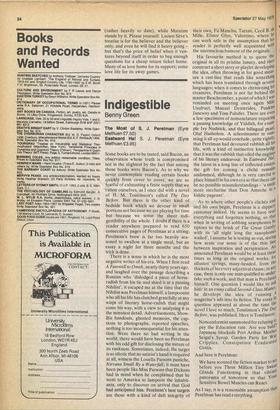Indigestible
Benny Green
The Most of S. J. Perelman (Eyre Methuen £7.50)
Eastward Hal S. J. Perelman (Eyre Methuen £3.95) Some books are to be tasted, said Bacon, an observation whose truth is compromised not in the slightest by the fact that among those books were Bacon's. As to why we never contemplate reading certain books quickly from cover to cover, we are so fearful of exhausting a finite supply that we ration ourselves, as I once did with a novel of H. M. Tomlinson's called The Day Before. But there is the other kind of bedside book which we devour in small portions not because we are playing for time but because we sense the sheer indigestibility of the whole. I doubt if there is a reader anywhere prepared to read 650 consecutive pages of Perelman at a sitting; Perelman's brew is far too heavily seasoned to swallow at a single meal, but an essay a night for three months and the trick is done.
There is a sense in which he is the most negative writer of his era. When I first read A Farewell to Omsk, nearly thirty years ago, and laughed over the passage describing a Russian who 'dislodged a piece of horseradish from his tie and shied it at a passing Nihilist', it escaped me at the time that the Nihilist was Perelman himself, a lampoonist who all his life has clutched gratefully at any wisps of literary horse-radish that might come his way, with a view to analysing it in the minutest detail. Advertisements, ShowBiz handouts, ghosted memoirs, the captions to photographs, reported speeches, nothing is too inconsequential for his attention. Were there no bad writing in the world, there would have been no Perelman with his odd gift for disclosing the nature of its rankness. Sometimes, indeed, the target is so idiotic that no satirist's hand is required at all, witness the Louella Parsons pastiche, Nirvana Small By a Waterfall; it must have been people like Miss Parsons that Dickens had in mind when he complained that he went to America to lampoon the inhabit ants, only to discover on arrival that God had anticipated him. Perelman's best targets are those with a kind of daft integrity of dc he
their own, Fu Manchu, Tarzan, Cecil B. Mille, Elinor Glyn, Valentino, where can work safe in the assumption that his reader is perfectly well acquainted Wltb the unconscious humour of the originals.
His favourite method is to quote the original in all its pristine lunacy, and then construct a short story or playlet developing the idea, often throwing in for good meas' ure a cast-line that reads like something which has been translated through several languages; when it comes to christening his creatures, Perelman is not far behind the master Beachcomber, a point of which I was reminded on meeting once again Mile Usufruct, Manuel Dexterides, Punkills Janeway and Tom Pulsifer. There are even a few specimens of nomenclature requiring a passing knowledge of Yiddish, for exam' pie Ivy Nudnick, and that bilingual pearl, Olaf Hasholem. A schoolmaster in surn' ming it all up would conclude, quite right1Y, that Perelman had devoured rubbish all his life, with a kind of instinctive knowledge that it was the rubbish that oiled the engines of his literary endeavour. In Eastward Hai' the latest in a long line of collected essaYs' the gift for coining a cliché remains undimmed, although he is very careful lo place himself in his own era so that there can be no possible misunderstandings — 'a smile more saccharine than Don Ameche kiddie pageant'. As to where other people's clichés end and his own begin, Perelman is a slipie customer indeed. He seems to have read everything and forgotten nothing, so that when in writing of sobbing saxophones he tiptoes to the brink of The Great GOO with its 'all night long the saxophones wailed', I assume he is testing us out, seeing how acute our sense is of the thin line between inspiration and perspiration. M annotated Perelman would be at least three times as long as the original works, fur allusion springs, many-headed, from the thickets of his every adjectival clause; in anY case, there is only one man qualified to under take such a work, and that man is PerelMan himself. One question I would like to ask him: in an essay called Second-Class Matter, he develops the idea of running .11 magazine's ads into its fiction. The essay in question appeared at about the time the novel I love so much, Tomlinson's The Day Before, was published. Here is Tomlinson: Nonconformist summoned for refusing t° pay the Education rate. Are you bald? Japanese blockade Port Arthur. Mc 'the Seigal's ,Syrup. Garden Party for VI. Cripples. Constipation Eradicated Gratis.
And here is Perelman:
We have scoured the fiction market to set before you Three Million Tiny Sweat Glands Functioning in that vibrant panorama of tomorrow so that Your Sensitive Bowel Muscles can React.
As I say, it is a reasonable assumption that Perelman has read everything.


































 Previous page
Previous page